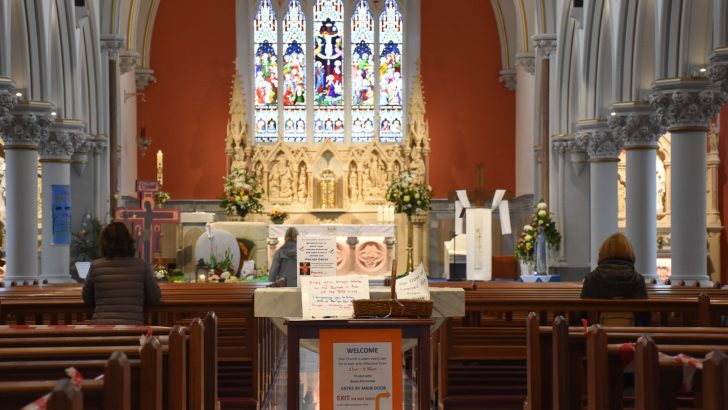Continuing restrictions need to be provided for
Chai Brady, Róise McGagh and Aron Hegarty
Bishop Donal McKeown has said that Church leaders must come up with a plan to show health authorities that social distancing can work in parishes when restrictions start to ease.
As authorities on both sides of the border prepare to reconsider lockdown measures that have meant public Masses are suspended and forced churches in the North to close entirely, the Bishop of Derry said that the Church needs a plan.
“At some stage this lockdown is going to eased, people at some stage will be allowed to go back to churches, people at some stage will be allowed to celebrate baptisms and marriages even if only for small groups.
“Our job is to be preparing for what we would say – what we would do – when that possibility arises,” he said.
In his own diocese, Dr McKeown said they are working on “the things that we would guarantee to undertake to do as soon as the churches are open, as soon as baptisms and weddings are possible and as soon as Masses are possible. Whether it’s three in a seat, and ticket-only and lots of Masses to cover a large number of people,” we need to be ready Dr McKeown said.
Guidelines
In Ossory, Bishop Dermot Farrell said that while churches were not closed, “given that social distancing will be with us for some time to come, we would welcome – if the guidelines of the NPHET allowed – the easing of restrictions for prayer, including and especially for funerals, Sunday and weekday Masses”.
Bishop Phonsie Cullinan of Waterford and Lismore told The Irish Catholic that the Church is trying to balance the spiritual needs of parishioners with health and safety.
“How do you limit the numbers and what do you do with Holy Communion? How do you distribute Holy Communion in a way that is going to be safe,” he asked.
“It’s not easy to solve…I am certainly getting a lot of requests here for Mass to recommence,” Bishop Cullinan said.
Bishop of Ferns Denis Brennan said that “refraining from attending church for Sunday Mass for the good of others is something we never anticipated. Our people have been very understanding as to why this was necessary and their adaptation to spiritual participation – through varying media – has been almost seamless and widespread.
“Like every other grouping in society, we in the Church await the day when a move back to ‘physical presence’ on Sundays becomes possible. Quite likely it will be gradual. It will also require careful planning and co-ordination.
“Returning as a public congregation of whatever number is a day we look forward to, and it’s one that will hopefully herald the permitted return of the fuller congregations – with the weekly reception of Communion – as we enjoyed so well, until recently,” Bishop Brennan said.
He said he wanted to “compliment priests on the creative ways they have come up with to reach out to people, and people for the way they have embraced and participated in the various online liturgies.”
Bishop of Killaloe Dr Fintan Monahan told The Irish Catholic that the bishops of Munster – where the decision was made to close churches – will address the issue this week in an online meeting. “The fervent hope would be that we would be able to reopen churches for personal prayer but that depends on the content of the advice given by the health authorities.
“The priority is the protection and safety of vulnerable people who might be at potential risk of the virus,” Bishop Monahan said.
Bishop McKeown said that Church authorities had a responsibility to cater for the spiritual needs of people.
“We can be a bit easy in measuring the economic effects, we can measure the health effects of the things that we do, but I think we have to look at the spiritual, the emotional, the general welfare of people which is much less measurable, much less tangible but equally important for very many people who are really distressed and they can’t get into the church.
“Our job is to propose to government reasonable ways forward. Our job is to lobby them to say ‘this is a reasonable way forward, we can do this without endangering anybody and that was the line we pushed about considering the cemeteries’,” he said.
The Church will prioritise people’s health but will also go beyond economic and hygienic concerns



